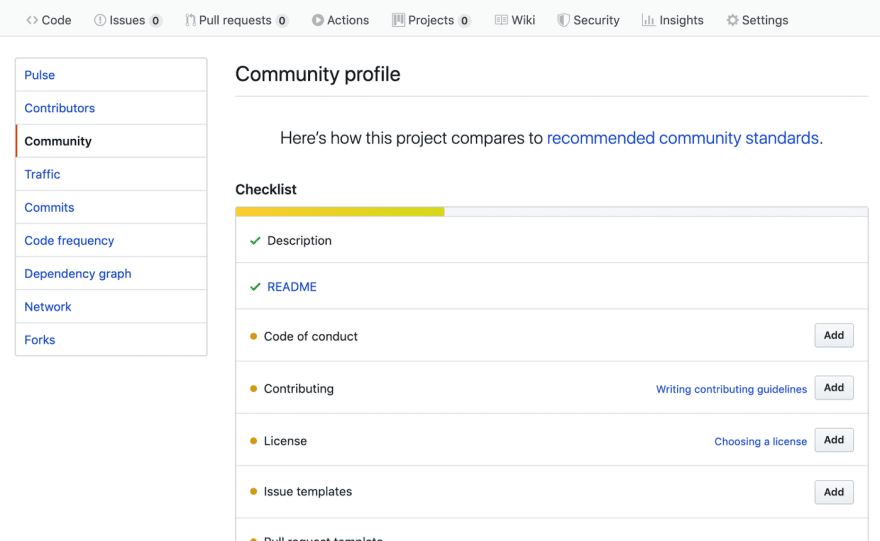An Interest In:
Web News this Week
- April 26, 2024
- April 25, 2024
- April 24, 2024
- April 23, 2024
- April 22, 2024
- April 21, 2024
- April 20, 2024
How I published my first npm package?
This article is originally posted here.
I thought making and publishing an NPM package isnt easy.
Actually, its so easy! Your package doesnt have to be very tricky, unique, and awesome.
You can publish your favorite utility code and install it on your project with npm or yarn command.
All I want to say isits not complicated. We can do it!
TL;DR
This time I publish an npm package called @taishikato/slug-generator which generates slug string from text such as blog post title.
e.i. The string below is the slug for this URL(https://medium.com/@TaishiKato/how-i-published-my-first-npm-package-5388564bf643).
how-i-published-my-first-npm-package-5388564bf643How to publish
Create an account
Lets make an npm account here.
Login via CLI
npm command takes care of you.
$ npm adduserUsername: your-usernamePassword:Email: (this IS public) your-emailLogged in as your-username on https://registry.npmjs.org/.Great. Now you are logged in.
Then make a directory for the package.
$ mkdir slug-generator && cd $_Now you are under the slug-generator directory.
We want to make our package scoped package to use the name (slug-generator in this case) that already is taken by someone.
Execute yarn init to generate a package.json. You will be asked some questions so please answer them.
$ yarn inityarn init v1.16.0warning ../../package.json: No license fieldquestion name (slug-generator): @taishikato/slug-generatorquestion version (1.0.0):question description: generate slug stringquestion entry point (index.js):question repository url: https://github.com/taishikato/slug-generatorquestion author: taishikatoquestion license (MIT):question private: falsesuccess Saved package.json Done in 68.06s.Then you need to use npm publish access=public to publish a public package.
$ npm publish --access=publicnpm noticenpm notice @taishikato/[email protected] notice === Tarball Contents ===npm notice 258B package.jsonnpm notice === Tarball Details ===npm notice name: @taishikato/slug-generatornpm notice version: 1.0.0npm notice package size: 257 Bnpm notice unpacked size: 258 Bnpm notice shasum: bf71ac427082c283c6d2cf600f7d1691ab0b5964npm notice integrity: sha512-clwDAYf181ObB[...]5pwvhOJbTUAiA==npm notice total files: 1npm notice+ @taishikato/[email protected]All done. Too quick? But yes version 1.0.0 of your package is on npm.
But we still dont have a README, LICENSE file, and actual lines of codes.
Add README!
Yes, we need a blazing README.
Go to shields.io to generate budgets and show how cool we are.
At first, we generate a budge to display the version of your package on npm.
Next, we got an error because we dont have any code yet but generate it anyway.
Make a README.md file and paste the budgets you made.
Lets add some code (Finally)
Just simple code here.
import { v4 as uuidv4 } from 'uuid';const generateSlug = (target, hasUuidSuffix = false) => { const text = target.toLowerCase(); const filterdText = text.replace(/[^a-zA-Z0-9]/g, ' '); let textArray = filterdText.split(/\s|\n\t/g); textArray = textArray.filter(text => { return text !== ''; }); const slug = textArray.join('-'); if (hasUuidSuffix) return `${slug}-${uuidv4().split('-')[0]}`; return slug;};export default generateSlug;License
Hit this page (InsightsCommunity) on Github.
Choose MIT anyway
Version
By the way, npm uses Semantic Versioning. You dont need to know the detail of it now but the main rules and concepts are
Given a version number MAJOR.MINOR.PATCH, increment the:
- MAJOR version when you make incompatible API changes,
- MINOR version when you add functionality in a backwards compatible manner, and
- PATCH version when you make backwards compatible bug fixes.
We need to change the major version so use the command below.
$ npm version majorv2.0.0Publish
$ npm publishnpm noticenpm notice @taishikato/[email protected] notice === Tarball Contents ===npm notice 1.1kB LICENSEnpm notice 496B index.jsnpm notice 304B package.jsonnpm notice 901B README.mdnpm notice === Tarball Details ===npm notice name: @taishikato/slug-generatornpm notice version: 2.0.0npm notice package size: 1.7 kBnpm notice unpacked size: 2.8 kBnpm notice shasum: a43b58c8d1434faaeaf207778619981d5b372bd5npm notice integrity: sha512-u4jsqO8B7j3PY[...]kfdDVtGHT4+Zw==npm notice total files: 4npm notice+ @taishikato/[email protected]Add some keywords on package.json
Mine is something like this
{ "name": "@taishikato/slug-generator", "version": "2.0.0", "description": "generate slug string", "main": "index.js", "repository": "https://github.com/taishikato/slug-generator", "author": "taishikato", "license": "MIT", "private": false, "dependencies": { "uuid": "^7.0.2" }, "keywords": [ "slug", "npm", "package", "taishikato", "slug generator" ]}Thank you!
Now you can ship your code on npm!
You can do it for your future projects.
You can do it for the developers community.
Its great for any reason.
What are you waiting for?
Lets make a package.json and output something in this world!
Reference
Thank you Jonathan Wood for the great article!
How to make a beautiful, tiny npm package and publish it
taishikato/slug-generator
taishikato/slug-generator: Slug generator for blog posts or any other contents
Original Link: https://dev.to/taishi/how-i-published-my-first-npm-package-28hi
Dev To
 An online community for sharing and discovering great ideas, having debates, and making friends
An online community for sharing and discovering great ideas, having debates, and making friendsMore About this Source Visit Dev To







